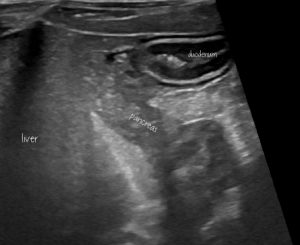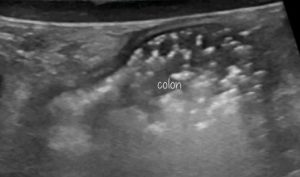Why do we see concurrent pancreatitis and enterocolitis in dogs?…and other related issues
It’s been an interesting empirical observation that acute haemorrhagic diarrhoea syndrome (haemorrhagic gastroenteritis) is commonest in small breed dogs susceptible to pancreatitis. A related phenomenon is the prevalence of gastrointestinal episodes in dogs with diabetes mellitus.
‘ In the light of the current advance in understanding the basis of canine hemorrhagic gastroenteritis, the well-recognized association of this disease with small breed dogs may be explained by the increased incidence of pancreatitis in small rather than in large breed dogs, since pancreatitis will disrupt pancreatic trypsin production‘
To quote from:
PLoS One. 2015; 10(4): e0122684.
A Novel Pore-Forming Toxin in Type A Clostridium perfringens Is Associated with Both Fatal Canine Hemorrhagic Gastroenteritis and Fatal Foal Necrotizing Enterocolitis
Iman Mehdizadeh Gohari,# Valeria R. Parreira,# Victoria J. Nowell, Vivian M. Nicholson, Kaitlyn Oliphant, and John F. Prescott*
https://www.ncbi.nlm.nih.gov/pmc/articles/PMC4390311/
Often this correlation can be seen in individual patients. As sonographers we commonly note pancreatic and peripancreatic changes in dogs with acute gastrointestinal signs.

Pancreatic and peripancreatic changes suggestive of mild pancreatitis in a terrier with acute gastrointestinal signs. The peripancreatic fat is appreciably hyperechoic in relation to the pancreatic parenchyma.

Diarrhoea with gas bubbles in the colon of the same patient.
As outlined above, one theory was that the inflamed pancreas secretes less trypsin and this might cause dysbiosis.
More recently the plot has thickened: turns out the pancreas has further talents. As summarised here…
Beyond Digestion: The Pancreas
Shapes Intestinal Microbiota and Immunity
Herbert Tilg1 and Timon E. Adolph
https://www.cell.com/cell-metabolism/pdf/S1550-4131(17)30112-2.pdf
…the pancreas actually secretes specific antimicrobials (such as CRAMPs -cathelicidin-related antimicrobial peptides). These modulate gut microbial communities, resulting gut immune responses and inflammation.
In complement, gut bacterial metabolites such as fatty acids control release of these chemicals and regulate pancreatic immune system responses which, for example, affect the development of immune-mediated diabetes (at least in mice).
Immunity 43, Issue 2, 18 August 2015, Pages 304-317
Pancreatic β-Cells Limit Autoimmune Diabetes via an Immunoregulatory Antimicrobial Peptide Expressed under the Influence of the Gut Microbiota
Author links open overlay panelJiaSun1LaetitiaFurio23RamineMecheri3Anne M.van der Does4ErikLundeberg4LoredanaSaveanu35YongquanChen1Petervan Endert35BirgittaAgerberth67JulienDiana
https://www.sciencedirect.com/science/article/pii/S1074761315003027
Collectively, these studies provide evidence for a close communication loop between the pancreas and the intestine. Disturbances in this loop may cause predisposition to pancreatic and intestinal disease, respectively.
Still confident we know what we’re doing when we give antibiotics to dogs with acute GI signs?!






Do probiotics aggravate pancreatitis in dogs?
no….not as far as we know. I guess nothing is impossible tho!’probiotics’ might mean all kinds of bacterial strains and gut flora is so complex -we’re right in the early days of understanding how it all works